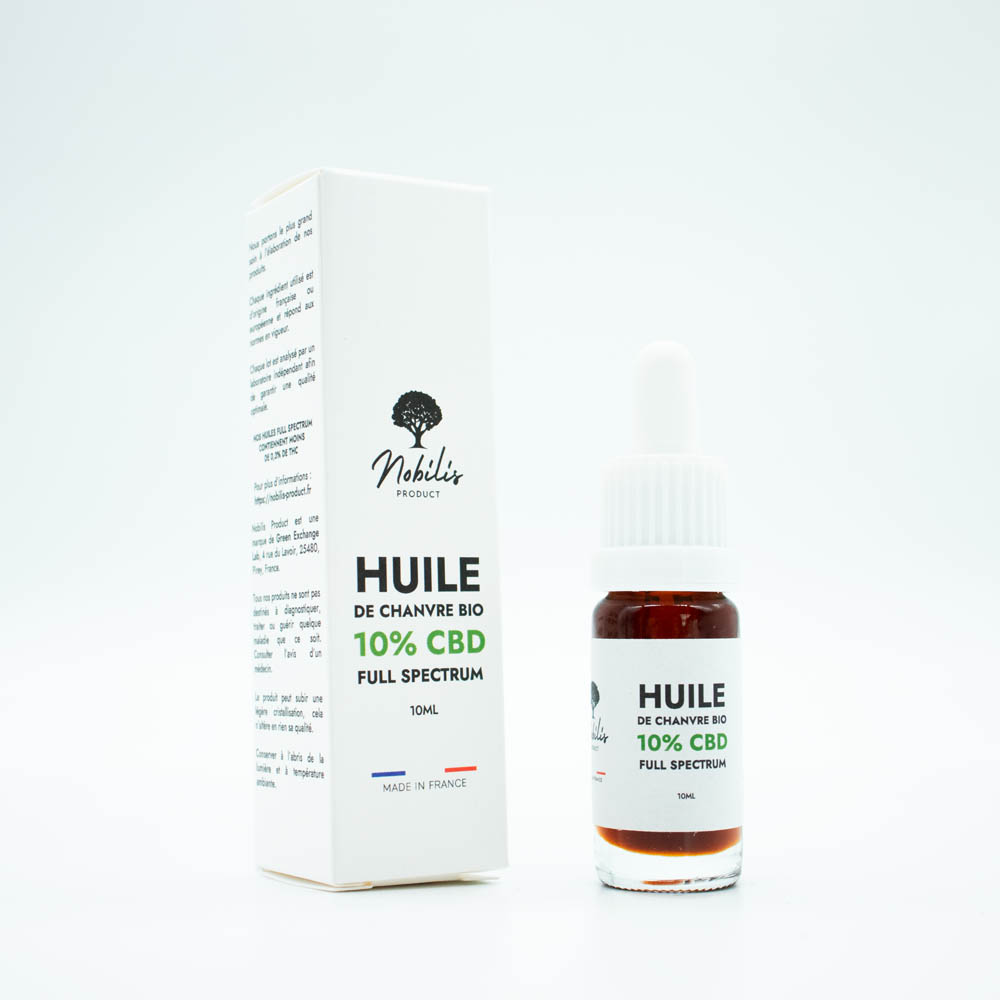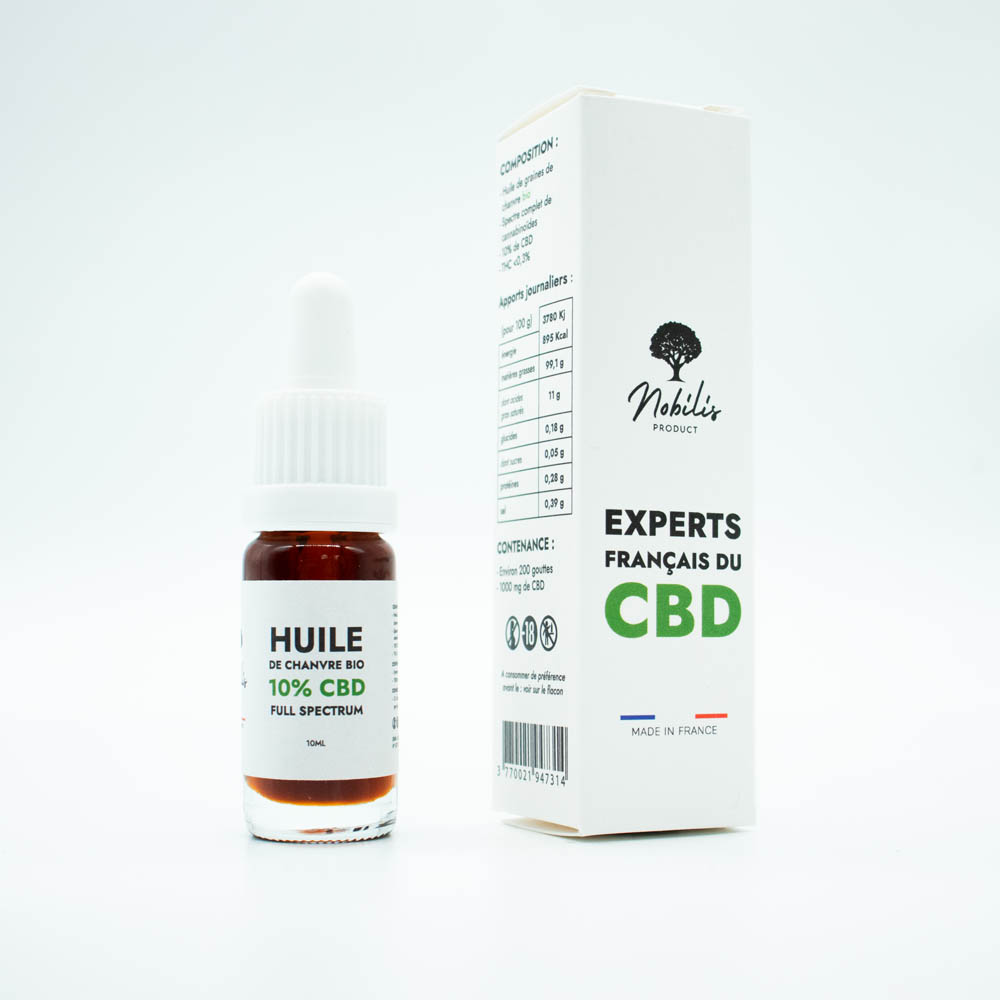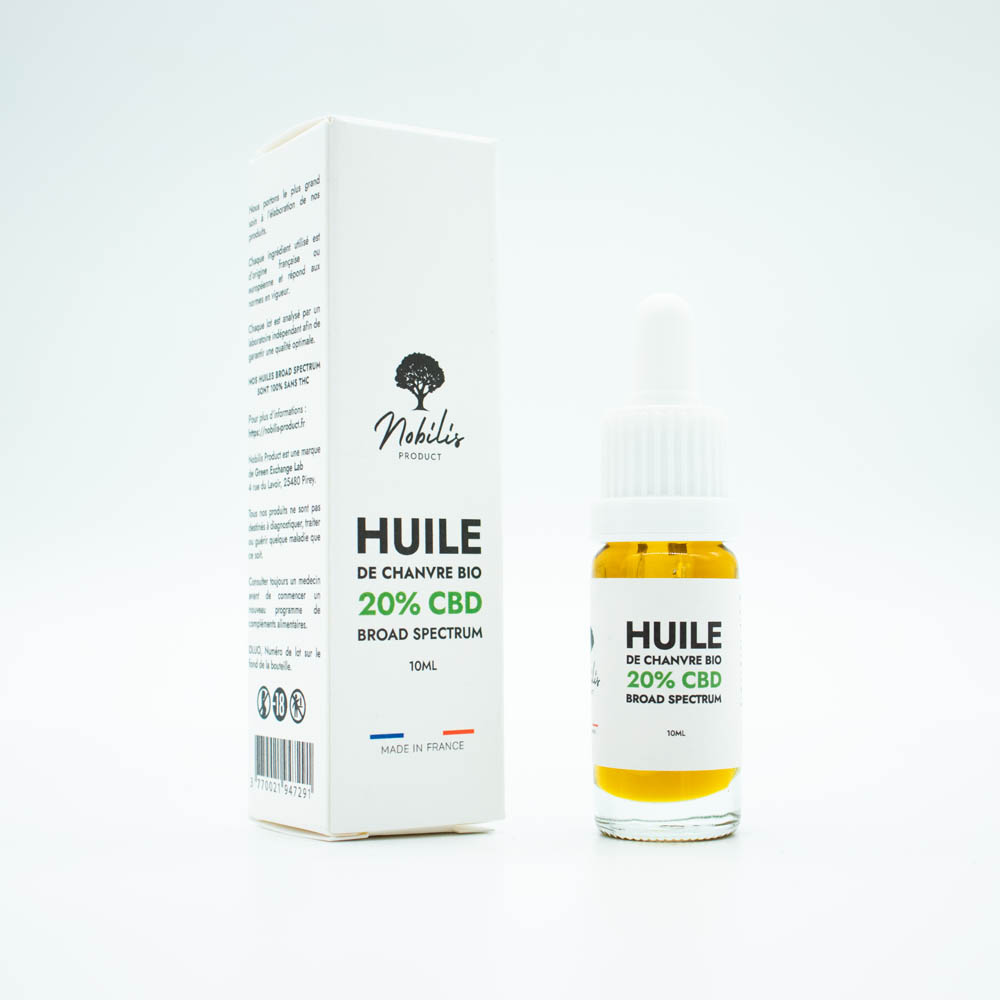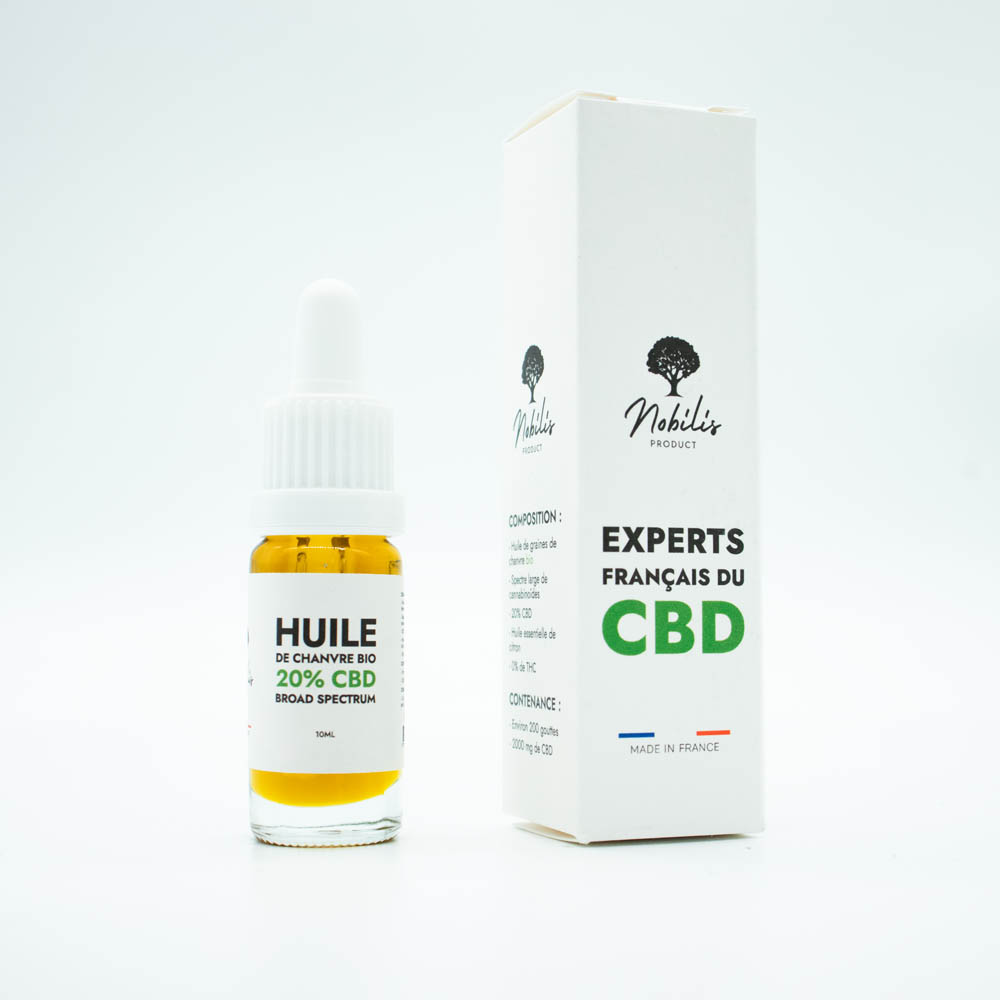Irritable bowel syndrome (IBS) is a common gastrointestinal disease that significantly reduces the quality of life of sufferers. Moreover, as a pathology with multifactorial causes and variable symptoms, IBS remains complex to treat.
However, since scientists discovered the affinity of hemp-derived molecules (=cannabinoids) with our bodies, research has been focusing on the development of a cannabidiol (CBD)-based treatment for irritable bowel syndrome.
In fact, CBD is a non-psychotropic molecule whose safety has been demonstrated, and whose affinity with certain organs, notably those of the digestive system, gives it potentially interesting properties.
Table of contents
Irritable bowel syndrome (IBS): definition, symptoms, causes and treatments
Irritable bowel syndrome, also known as irritable bowel disorder (IBS), is not linked to an organic lesion, as is the case with ulcerative colitis or Crohn's disease. In fact, apart from certain similar gastrointestinal symptoms, IBS has nothing to do with chronic inflammatory bowel disease (IBD).
What is irritable bowel syndrome?
Irritable bowel syndrome is a functional gastrointestinal disorder that manifests itself through a variety of unpleasant symptoms:
- Abdominal pain, often described as cramps, which varies in intensity and location from person to person;
- Bloating;
- Excessive gas;
- Digestive problems that may manifest as diarrhea (IBS-D), constipation (IBS-C), or an alternation between the two (IBS-M).
- Finally, most patients report an urgent and frequent need to go to the toilet and a sensation of incomplete bowel emptying.
Please note that IBS is not a temporary gastric discomfort. In fact, people with IBS suffer from these symptoms chronically, i.e. over a long period of time, even if the symptoms may disappear momentarily.
In all cases, it's important to consult a doctor to rule out any other illness (such as IBD or cancer), intolerance (to lactose or certain nutrients, for example), or allergy.
What causes irritable bowel syndrome?
The causes of irritable bowel syndrome remain largely unknown, and as we have already mentioned, it is a multifactorial disease.
In fact, several factors are thought to contribute to the development of IBS. These include:
- Abnormalities in intestinal motility, i.e. the movement of intestinal muscles that causes diarrhea;
- An imbalance in intestinal bacterial flora (caused by prolonged use of antibiotics or chronic alcohol consumption) may explain bloating and gas;
- Increased sensitivity of the viscera, i.e. hypersensitivity to signals from the internal organs responsible for abdominal pain and cramps;
- Or psychological factors, such as stress, anxiety and depression, may also play a role in the onset and severity of IBS symptoms.
What about treatments?
Treatment of irritable bowel syndrome is primarily aimed at relieving symptoms and improving patients' quality of life. Indeed, as the disease has no underlying biological cause, there is no definitive cure.
Therapeutic approaches recommended for people with IBS generally include:
- Lifestyle modifications: mainly dietary adjustments, such as the introduction of a high-fiber diet, but also reducing consumption of certain trigger foods, notably FODMAPs (fermentable carbohydrates), fructose and lactose;
- Taking antispasmodic medication to reduce intestinal cramps, and/or laxatives to manage constipation (in the case of IBS-C) or antidiarrheals in the case of IBS-D;
- Cognitive-behavioural therapy can also be used to manage stress and anxiety, both of which aggravate the disease. The practice of yoga and meditation may also be recommended.
Despite this, most of the medications used to treat IBS have a number of undesirable side effects. Moreover, given the risk of addiction, they are not really a long-term solution. Against this backdrop, CBD offers a glimmer of hope...
What are the benefits of CBD on irritable bowel syndrome?
As we mentioned earlier, the molecules synthesized in hemp, such as CBD, have a very particular affinity with the human body. In fact, they have the ability to bind to certain neurotransmitters (called endocannabinoid receptors) located throughout the body, including the digestive system.
Studies show that numerous CB2-type endocannabinoid receptors are found in the intestine, colon and stomach. Their mechanisms of action are not yet fully understood, but initial findings are encouraging.
Acts as an antidiarrheal
Several studies [1] suggest that CBD may regulate contractility in the gastrointestinal tract. In concrete terms, it could be beneficial in the case of IBS-D, acting as an anti-diarrheal.
It's worth noting that IBS-C sufferers can take CBD without fear of worsening constipation. In fact, CBD is an adaptogenic molecule: in other words, it acts where the body needs it. In other words, if the contractility of the digestive tract is normal, CBD will have no effect on it.
Please note, however, that this does not mean that CBD can replace treatment, nor that patients can dispense with their doctor's advice!
Reduces the intensity of abdominal pain
As mentioned above, visceral hypersensitivity is a major component of the disease. It is thought to be responsible for the abdominal pain associated with IBS. In this sense, taking CBD could help reduce this type of pain. Indeed, some studies suggest that it may act on the mechanisms that promote increased sensitivity to movements of the digestive tract. [2]
CBD also has a global anti-pain effect through its interaction with the endocannabinoid system. Several studies show that it is capable of modifying pain perception via its action on certain key neurotransmitters (notably serotonin), but also thanks to its anti-inflammatory properties.
Improves quality of life for IBS sufferers
The endocannabinoid system consists of a vast network of receptors distributed throughout the body, whose common role is to maintain the organism in a state of homeostasis, i.e., equilibrium.
Thus, CBD, which has the ability to stimulate the endocannabinoid system, could act at different levels and thus improve the quality of life of IBS sufferers. In particular, it could:
- Act on imbalances in intestinal flora, particularly in the secretion of digestive enzymes;
- Reduces stress and anxiety through its action on serotonin synthesis;
- But also improve sleep quality and thus combat chronic fatigue.
Of course, we must beware of thinking that CBD is a miracle product. In fact, its consumption cannot produce any beneficial effects unless healthy lifestyle measures are taken!
Which CBD product and dosage for IBS?
Remember that it is essential to seek medical advice before taking CBD if you are undergoing treatment for irritable bowel syndrome.
Which CBD?
To reduce the impact of symptoms caused by IBS, we generally recommend full spectrum CBD oil. Indeed:
- CBD oil is a practical, discreet dosage form that appeals to a wide range of consumers. What's more, the oral route of administration ensures good bioavailability;
- Full spectrum" products are formulated with all the molecules synthesized in hemp, making them even more effective. Cannabinoids and terpenes work in synergy. These products contain THC, at less than 0.3% as required by law. Note that this concentration is too low to cause any side effects.
We also advise you to pay close attention to the quality of CBD oil. Opt for an organic product, sold with laboratory analysis results guaranteeing the oil's composition, absence of harmful substances and cannabinoid concentration (notably CBD and THC).
-
CBD Oil 10% Full Spectrum - Nobilis Product
Rating 4.75 out of 524,90 €Discover our Full Spectrum 10% CBD oil from hemp grown in France, without additives or GMOs. Its richness in cannabinoids and terpenes guarantees an optimal surrounding effect for deep relaxation and natural well-being. Practical 10 ml bottle with pipette for precise dosage.
Our Full Spectrum 10% CBD oil is :
🇫🇷 Manufactured from A to Z (from hemp extraction to bottling) in our French laboratory.
🧪 Made with CBD crude to provide all the cannabinoids, flavonoids and terpenes.
✅ Analyzed by an independent laboratory for each batch to guarantee quality.
-
Broad Spectrum 20% CBD Oil - THC-free
Rating 5.00 out of 529,90 €Opt for our Broad Spectrum 20% CBD oil, a higher concentration for more powerful soothing and relaxing effects. Perfect for those seeking optimal relief from the natural THC-free benefits of CBD.
Our Broad Spectrum 20% CBD oil is :
🇫🇷 Manufactured from A to Z (from hemp extraction to bottling) in our French laboratory.
🧪 Made with CBD distillate to provide all the cannabinoids except THC.
✅ Analyzed by an independent laboratory for each batch to guarantee quality
What dose and how often?
The dosage of CBD oil is always a thorny question, whether in the context of IBS or not. Indeed, there is no universal dosage, as it depends on a whole host of factors inherent to each individual (age, weight, intensity of symptoms, sensitivity to cannabinoids...).
That's why we recommend a gradual approach, starting with a low dose (3 to 5 drops a day) of a low-concentration oil (between 5 and 10%) and gradually increasing it every 5 to 7 days until you feel the effects.
In any case, if you have any questions, don't hesitate to contact our team!




